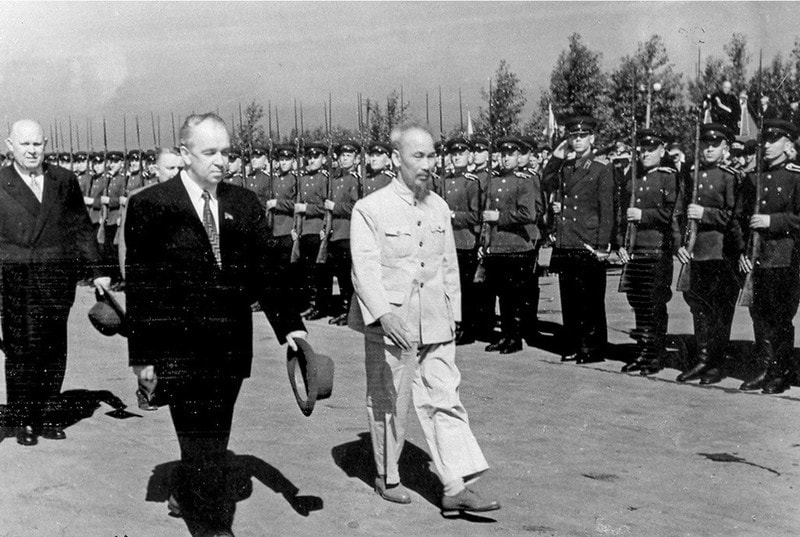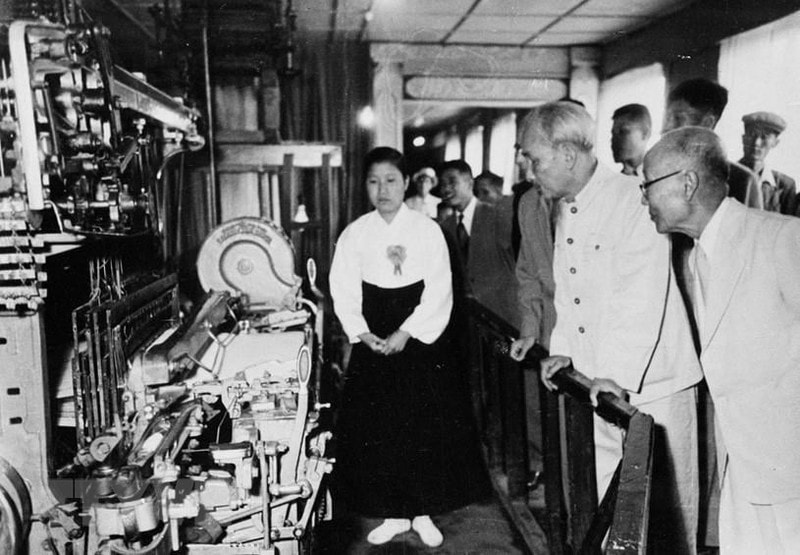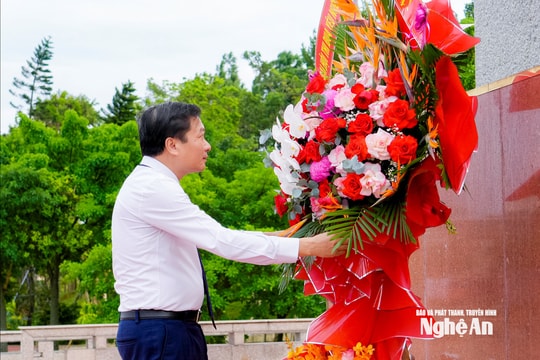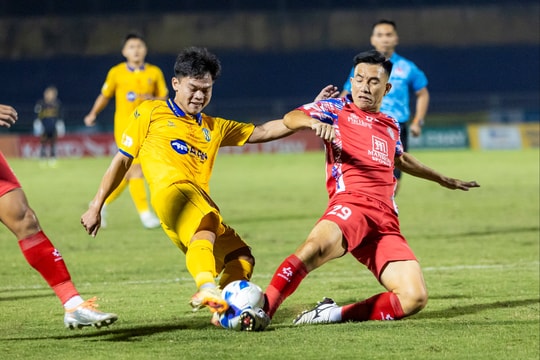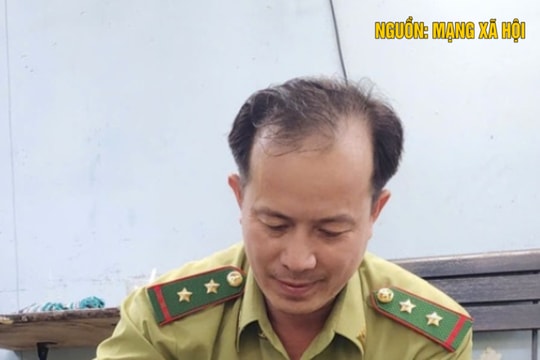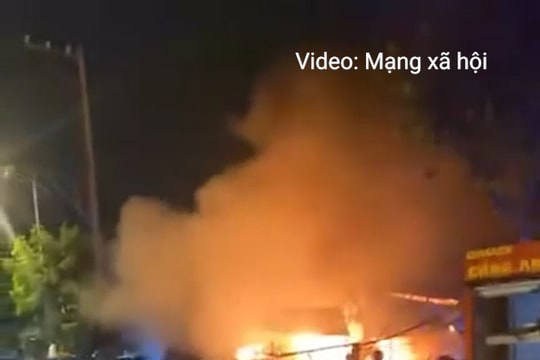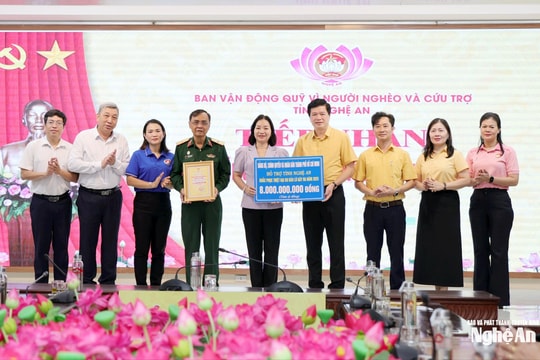Ho Chi Minh's Art of Diplomacy - Diplomacy for People
"Ho Chi Minh's flexible behavior in diplomatic communication has become legendary stories."
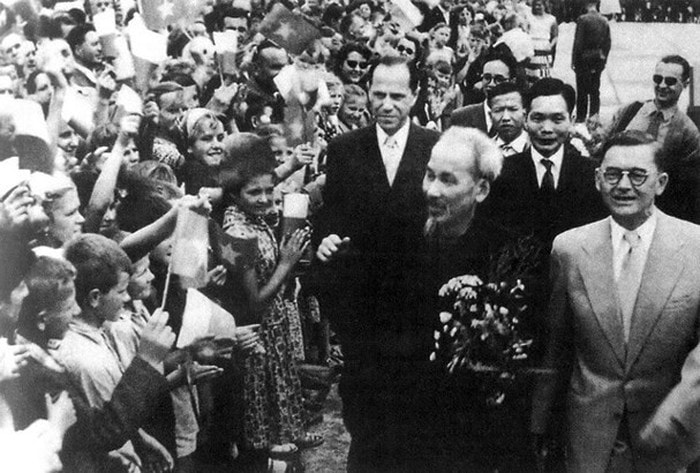 |
| Polish people warmly welcomed President Ho Chi Minh and the delegation of the Government of the Democratic Republic of Vietnam, July 1957. Photo: Archive |
President Ho Chi Minh was an outstanding politician, a cultural celebrity and an excellent diplomat. His foreign policy ideology and diplomatic style were the crystallization of the nation's tradition and the quintessence of humanity, in which people's diplomacy was an important multi-channel and multi-functional "army", together with Party and State diplomacy, forming the nation's comprehensive diplomacy.
His skillful behavior in foreign affairs contributed significantly to the victory of the Vietnamese revolution as well as the movement for common peace of mankind. Prime Minister Pham Van Dong said, "Ho Chi Minh's flexible behavior in diplomatic communication has become legendary stories."
On his birthday, every Vietnamese person has very special feelings for Uncle Ho, not only because he is the leader who gave birth to the Democratic Republic of Vietnam, now the Socialist Republic of Vietnam, but more than that, because of his familiar image, the simple, warm affection that he gave us while he was alive.

Touching and impressive TV show: 'Ho Chi Minh - Shining Vietnamese will'
(Baonghean.vn) - On the evening of May 18, comrade Tran Quoc Vuong - Politburo member, Standing member of the Secretariat, together with the delegation of the Central Committee and Nghe An province attended the live television broadcast: "Ho Chi Minh - Shining Vietnamese will" at the Kim Lien National Special Relic Site, Nam Dan (Nghe An).
As someone who used to work in the diplomatic sector (spokesperson of the Ministry of Foreign Affairs) and now in the field of foreign information, Mr. Le Hai Binh, Deputy Head of the Steering Committee for Foreign Information Work, Central Propaganda Department, has heard and learned many things and stories about Him.
Diplomacy and propaganda are two difficult and complex fields.
“For every Vietnamese person, Uncle Ho is always a great and familiar image. The stories in his revolutionary life bring us valuable lessons. Personally, I am very honored and proud to work in two sectors that were founded, trained and always cared for by beloved Uncle Ho. He also directly worked in these two fields until the last years of his life, even during the time he was abroad looking for a way to save the country. Right from that time, our Uncle Ho actively and regularly carried out foreign affairs and foreign information activities, always for the benefit of the country. In the diplomatic sector, we always remember Uncle Ho's teachings: Strength is the gong, and diplomacy is the sound, the bigger the gong, the louder the sound. This clearly shows his point of view on the close correlation between diplomatic work and the position and power of the country" - Mr. Le Hai Binh shared.
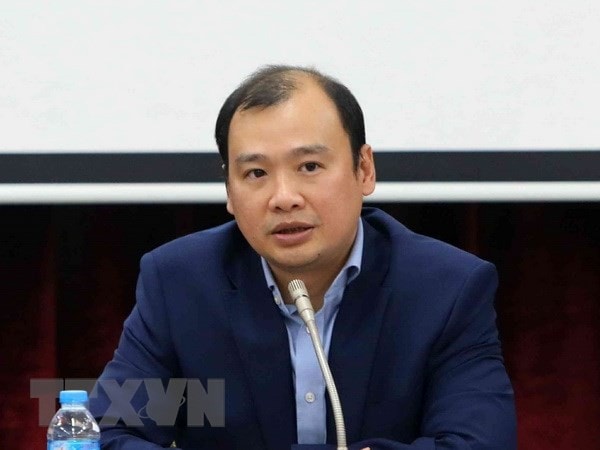 |
| Mr. Le Hai Binh, Deputy Head of the Steering Committee for External Information Affairs, Central Propaganda Department. Photo: VNA |
Regarding propaganda work, Mr. Le Hai Binh said that Uncle Ho gave simple instructions, ignoring all complicated theories to define: "Propaganda is to tell something to the people so that they understand, remember, follow, and do. If that goal is not achieved, then it is a failed propaganda." He also said that the task of propaganda work has two sides: one side is to seek benefits for the people, the other side is to avoid harm to the people. It can be said that diplomacy and propaganda are both difficult and complicated fields, but perhaps just remembering Uncle Ho's teachings is enough to have a compass and a handbook in all activities. Looking broadly at all fields and issues, Uncle Ho emphasized that the ultimate goal is for the people and the root is in the ethics of cadres.
Qualities of a future culture
President Ho Chi Minh is a name that is not only respected by the Vietnamese people but also admired and cherished by friends from all over the world. Vietnam - Ho Chi Minh is always mentioned by the people of Egypt and North Africa with admiration and respect. A nation that was occupied, oppressed and exploited stood up to fight for independence, and after more than 40 years, rose up to become an economic tiger in Southeast Asia. That makes them love Vietnam and respect President Ho even more. Many scholars and researchers say that even Uncle Ho's enemies reserved the most respectful words for him.
According to Mr. Le Hai Binh, what always attracted people to President Ho Chi Minh, no matter who they were, politicians or farmers, even sometimes enemies, was the qualities of a future culture: “In 1923, Soviet journalist and poet O. Mandenxtam met Uncle Ho, who was then still a young man named Nguyen Ai Quoc, and commented: “From Nguyen Ai Quoc radiated a culture, not Asian culture but perhaps a culture of the future. Through Nguyen Ai Quoc's noble gestures and calm voice, I seemed to see tomorrow, as if I saw the prospect of a peaceful sky and calm sea of world friendship as vast as the ocean" - Mr. Le Hai Binh shared.
Perhaps with the qualities of a future culture that made anyone who faced, communicated, and contacted Uncle Ho, even enemies and opponents, all had the utmost respect for him. Now thinking back, we can see that Ho Chi Minh carried within him a global ideology and culture, a very humane and benevolent humanity. In terms of external expression, he was always very simple and sociable, and behaved politely, from that behavior exuded knowledge but also very closeness. Perhaps that is why he received the respect of anyone who came into contact with him.
Many documents, witnesses and memoirs of politicians, historians and politicians both domestically and internationally mention Uncle Ho with the first element being: simple, natural, close and sincere, simple but elegant, polite, close, gentle but still ensuring principles.
|
President Ho Chi Minh reviews the Soviet Army's honor guard during the welcoming ceremony for the Vietnamese Government delegation on an official visit to the Soviet Union on July 12, 1955. Photo courtesy |
Culturally rich communication style
Regarding communication style, Mr. Le Hai Binh said that throughout his revolutionary life, Uncle Ho always showed a very simple, close, open, tactful and thoughtful communication style with everyone. It can be said that in the world, there are few leaders who have a communication style as rich in cultural values as our President Ho Chi Minh. He said: "Towards all people in all walks of life, we must have a flexible, clever attitude, know how to compromise, and respect people's personalities."
Prime Minister Pham Van Dong, a very close student of Uncle Ho, commented that President Ho Chi Minh was tall but not far, new but not strange, great but not pretending to be great, brilliant but not overwhelming, meeting for the first time but feeling like a long-time acquaintance. It was that simple, close, open and delicate cultural trait that made everyone, regardless of their status, background, purpose, and communication conditions, who had come into contact with Uncle Ho, all share the same feeling of respect and reverence, because of the great influence stemming from his moral character and his cultured behavior.

Uncle Ho was attached to the people all his life.
(Baonghean.vn) - Closely attached to the people, deeply understanding their legitimate thoughts and aspirations, throughout his life, Uncle Ho cared for and looked after the people's lives.
According to Mr. Le Hai Binh, the core of President Ho Chi Minh's art of behavior is: "First, he always determined what to do, what diplomatic contact, always put that interest closely with the interest of the people - this is always consistent. Second, in behavior, he always behaved humanely and culturally. Third, he was always skillful in locating the communication object so that from there he could have appropriate and proper methods, making people convinced."
Many diplomats, historians and politicians have talked about Uncle Ho's diplomatic behavior, which is a smooth combination of national culture with understanding of customs and practices of peoples around the world to create the art of diplomatic behavior. Uncle Ho's life traveled to many different countries and especially wherever he went, he always paid attention to learning and exploring the cultural characteristics of the place he went to. Therefore, Uncle Ho had a deep understanding of culture, psychology, language, customs and practices of many peoples, both in the East and the West.
|
| President Ho Chi Minh visited an exhibition of North Korea's economic achievements in Pyongyang on July 9, 1957, during his friendship visit to the Democratic People's Republic of Korea from July 8-12, 1957. Photo: VNA. |
Many researchers also said that his foreign policy ideology and diplomatic style are the crystallization of the nation's tradition and the quintessence of humanity. In which, people's diplomacy is an important multi-channel and multi-purpose arm, together with Party and State diplomacy, forming the country's comprehensive diplomatic resource.
Referring to the application of people's diplomacy in Ho Chi Minh's thought, Mr. Le Hai Binh also said that Uncle Ho had a very profound system of diplomatic ideology, in which people's diplomacy held a very important position: "Before founding the Party and the Democratic Republic of Vietnam, Uncle Ho was active in foreign affairs and that was people's diplomacy. As soon as Uncle Ho put forward the Vietnamese people's demands at the Versailles Conference, it was people's diplomacy. He once said, "Diplomacy is not the private matter of embassies and consulates, but also of other organizations such as Foreign Trade, Culture, Youth, Women, Trade Unions, etc." This is a viewpoint originating from our ancestors' ideology of taking people as the root, which he raised to the revolutionary cause in general, and diplomacy in particular is of the people."
During the resistance war against France, he always emphasized, “We want peace now, so that the blood of the French and Vietnamese people stops flowing. We value those red bloods equally.” During the resistance war against America, he said, “The American people fight from within, our people fight from without, if both sides attack strongly, the American imperialists will definitely lose. The Vietnamese and American people will definitely win. That will be a glorious victory of the united front of the people of the two countries and also a common victory of the people who love peace and justice.”
Mr. Le Hai Binh concluded: Our Party takes Marxism-Leninism and Ho Chi Minh Thought as its guiding principles, especially Ho Chi Minh Thought in diplomacy which is also applied very smoothly. Even during the Covid period, we have had very responsible and humane behaviors among friendship associations such as supporting and helping each other. From there, the friendship between the Vietnamese people and the people of other countries has been strengthened, transforming into a combination of national strength and the strength of the times.
Vietnam's foreign policy towards the world reflects the long-standing humane tradition of the Vietnamese people, of which Uncle Ho is a typical example in implementing that humane diplomatic policy. General Secretary and President Nguyen Phu Trong said, "Our people have a tradition of humanity, helping each other." This tradition is not only reflected in the kindness within the Vietnamese nation, but also between our people and the people of the world.
Ho Chi Minh diplomacy – human diplomacy is the selective combination of patriotism, national culture and Vietnamese diplomatic tradition, bringing a unique identity to Vietnamese diplomacy. Human diplomacy in Ho Chi Minh style is to understand others, share with others so that they understand you better.
Vietnamese culture present in Vietnamese diplomacy is the character of harmony and humanity, the nature of peace and tolerance, the delicate, flexible and supple behavior but steadfast in the principle of "the unchanging, adapt to all changes", all for the benefit of the nation. The world praises Ho Chi Minh's diplomatic style because he is not only an exemplary symbol of morality but also his diplomatic style is an example for leaders of other countries and politicians to learn./.

Each souvenir is a touching story about Uncle Ho.
(Baonghean) - Behind each souvenir is a touching story about Uncle Ho's life, noble morality, great yet simple personality. These are truly priceless assets for today's children to continue to study and follow his example.

